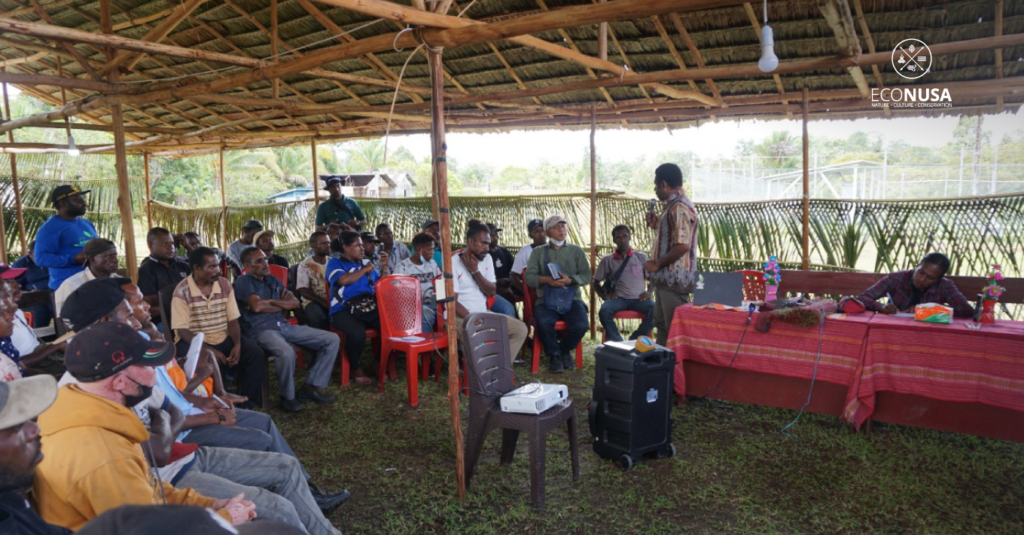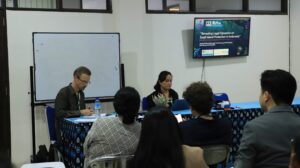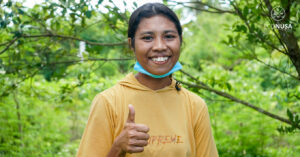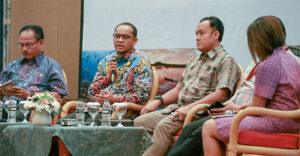
Social Transformation School (STS) at Mogatemin Village, Kais Darat District, South Sorong Regency, appeared to become the way for crucial and interesting discussion among villagers. They who have so far questioned on the status of their forests eventually got the answers, despite the dissatisfaction.
It could be seen from some STS Mogatemin participants when they addressed some questions to South Sorong Forest Management Unit (FMU)’s Section Head for Forest Planning and Utilization, Yermias Y. M. Thesia, following his presentation. The presentation was about the management of natural resources potential concerning with the protection of forests and ocean on the first day of STS on Saturday 26 March 2022.
“We as the community do not know the forest management means. In our village, we have red and white resins potentials. The locals cut the trees for sale. We do not know what will be the next. So, what should we do?” said Derek Tigori, an STS participant from Manelek Village.
Read also: Arguni Bawah Community Using Garden Yields for Organic Fertilizer
In response, Yermias said that the South Sorong FMU has not intervened Manelek as it is outside this FMU territory. But with the new regulation, the South Sorong FMU has already intervened Manelek to seek the potentials for further development.
“Formerly, the South Sorong FMU working area is only limited to the Protection Forest and Production Forest. Manelek Village is part of the Conversion Production Forest. So, with the new regulation (Government Regulation No. 23/2021), the South Sorong FMU could intervene the Conversion Production Forest. Thus, we will see the potentials for further development,” said Yermias.
However, Yermias hoped that the locals of Manelek and other villages could manage their nature potentials wisely. “It is okay to cut tree for housing construction. But never sell forest to other people as it will harm the community,” he said.
Read also: Social Transformation School Officially Opened by South Sorong Regent
The next query came from Alfaris Dere, STS participant from Mogatemin, on the status of conservation and protection forests. “We as the community are confused as the government claimed it to be the protection forest, or conservation forest, and not to cut tree, but later police will arrest. Please explain the difference and similarity of protection and conservation forests. Who defines a forest to be protection and conservation forests? Is it the community or the government?” asked Alfaris.
The questions made the discussion live as most of them had the same views. “Forest status in Indonesia is defined by the government. Conservation forest is to protect the biodiversity from extinction. In the forest, there is endemic fauna and flora that exist only on the location here. Therefore, forest is designated as the conservation forest to prevent endemic flora and fauna in Papua from extinction,” Yermias responded.
On the other hand, protection forest, according to Yermias, is a good forest to conserve ecology and ecosystem on the area. If the forest is degraded, a larger environmental system will be destroyed and give adverse impact to human. For instance, protected forest that keeps the water dupply. If the forest is degraded, the community could hardly afford clean water.
Read also: Village Head Workshop Preventing Forests from Loss
Yermias also elaborated the new job description of South Sorong FMU as stipulated by Article 123 of the Government Regulation Number 23/2021. It starts from planning forest management in the production forest, conservation forest, and protection forest.
In the context of special autonomy, the FMU performed the activity by making product while giving example to public on how to get the benefit from special economy deriving from non-timber forest product and taking role in each process. “In addition to unit manager, 1 FMU is obliged to control at least 1 product from start up to finishing and ready for sale,” said Yermias.
He explained that the FMU vision is to create a professional and independent FMU for forest conservation and people welfare in 2025. Thus, the South Sorong FMU has some missions. Some of them is to create opportunity and investment climate on forestry while developing entrepreneurship and business development on forestry. It is intended to get benefits from balances of environment, social, culture, and economy for people welfare. It is also to empower people in the context of regional autonomy, special autonomy for West Papua and Papua Provinces.
Read also: Lawang Oil, Hidden Potential of Boven Digoel
Some forest management activities done by South Sorong FMU are among others assistance and monitoring of licences holders of Timber Forest Product. In fact, three companies have acquired business permit for timber forest product (IUPHHK) given to PT. Bangun Kayu Irian, PT. Mitra Pembangunan Global, and PT. Manca Raya Agro Mandiri.
For the non-timber forest product, the South Sorong FMU promoted the management of sago, resin, agarwood, ant nest, essential oil, and honey from the community living nearby forests. In terms of ecosystem service, the FMU here jointly with the local neighborhood has developed waterfall tourism, photo spot, and bottled-mineral water.
Editor: Leo Wahyudi & Nur Alfiyah




